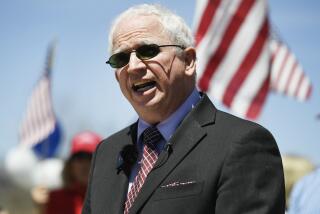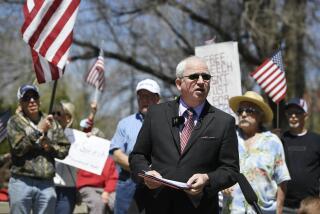Sen. East Takes Own Life at Home in North Carolina
- Share via
WASHINGTON — Sen. John P. East (R-N.C.), a rigid conservative who planned to quit the Senate at the end of his first term in December because of failing health, committed suicide in the closed garage of his home in Greenville, N.C., authorities said Sunday.
An aide found East, 55, dead shortly after 8 a.m. Sunday, and theorized that he had closed the garage doors, started the station wagon and inhaled deadly carbon monoxide fumes. A police spokesman told United Press International that the senator left a note to his family in which he mentioned his health problems.
Dr. Lawrence Harris, a state forensic pathologist, called the death a suicide after an autopsy late Sunday.
East was a Marine lieutenant in 1955--a year before the Salk poliomyelitis vaccine came into general use--when he suffered a bout with the disease that left him confined to a wheelchair. He was undeterred by the affliction, however, and, during the next 31 years, served as a college professor and was the Senate protege and unswerving ally of arch-conservative Sen. Jesse Helms (R-N.C.).
President Reagan, who enjoyed East’s support in most Senate roll calls, praised the North Carolina junior senator as “a true patriot . . . motivated by a deep sense of duty to his fellow man.”
“Never flamboyant or interested in personal acclaim, he was a quiet and effective legislator who never wavered in his belief in principle and in his determination to keep our country strong,” Reagan said in a statement issued from his ranch near Santa Barbara, where the President has been vacationing.
Helms, who gave substantial backing to East’s 1980 Senate campaign, said that East’s career represented a “profile in courage.” North Carolina’s Republican Gov. James G. Martin called East’s death “a tragic loss for the state.”
Governor to Name Stand-in
Martin, who is rated as less conservative than Helms, will name a successor to serve out the remainder of East’s term in the Senate. There was no immediate clue to Martin’s thinking, but there was speculation that he might take the opportunity to give a leg up to Rep. James T. Broyhill (R-N.C.), the Republican moderate who has already won the primary for the GOP’s Senate nomination. (The Democratic nominee is Terry Sanford, former president of Duke University.)
Early action to fill the vacancy may prove important to the Senate’s GOP leadership, which must deal temporarily with controversial end-of-session issues without one vote of its majority, which was 53 to 47 before East’s death.
East appeared in his wheelchair Thursday to support President Reagan’s controversial nomination of Daniel A. Manion to an appeals court judgeship. A final vote on Manion’s confirmation was put off until Congress returns from its Fourth of July recess, and many senators had predicted a 50-50 vote.
East is the first senator to take his own life since Lester C. Hunt (D-Wyo.), suffering from cancer, shot himself in his Senate office on June 19, 1954.
Suffered Thyroid Deficiency
Last year, East was hospitalized three times for hypothyroidism, a hormone deficiency that can cause anemia, fatigue, insomnia, intellectual impairment and depression. On Sept. 17, East announced that he would not run for a second term. Since then, however, colleagues said they had felt that he was holding his own.
East was born in Springfield, Ill., and was a 1953 Phi Beta Kappa graduate of Earlham College in Richmond, Ind. After two years in the Marine Corps, he earned a law degree from the University of Illinois in 1959 and, five years later, a Ph. D. in political science from the University of Florida.
In 1964, East joined the faculty of East Carolina University in Greenville, where he later said he was known as “one of those rare creatures in academe, a conservative political science professor.”
East lost badly when he ran for Congress and for secretary of state of North Carolina, but he earned political merit badges as a convention delegate and as his state’s GOP national committeeman in 1976.
East looked like a loser again in 1980, when he won the GOP nomination to challenge one-term Sen. Robert Morgan, a conservative-leaning Democrat who initially appeared to be well ahead in the race. But Helms’ money-raising organization, the Congressional Club, pumped $600,000 into a television blitz while East blasted Morgan for backing Carter Administration policies. In the end, East won--by 10,000 votes out of 1.7 million cast.
Right Side of Aisle
As a senator, East joined Helms on the far right flank of the GOP. One notable disagreement with Reagan came when he voted against the nomination of Caspar W. Weinberger as defense secretary because East doubted Weinberger’s commitment to a military buildup.
His main committee assignment was as chairman of the Judiciary Committee’s subcommittee on separation of powers, which approved an anti-abortion bill defining human life as beginning at conception. The bill did not pass.
East backed legislation to reduce the Supreme Court’s authority on matters such as abortion and school busing. He joined Helms in a desultory, weeklong filibuster that failed to block or alter a 1982 extension of voting rights law.
He is survived by his wife, the former Priscilla Sherk, and two daughters, Kathryn and Martha.
More to Read
Sign up for Essential California
The most important California stories and recommendations in your inbox every morning.
You may occasionally receive promotional content from the Los Angeles Times.










